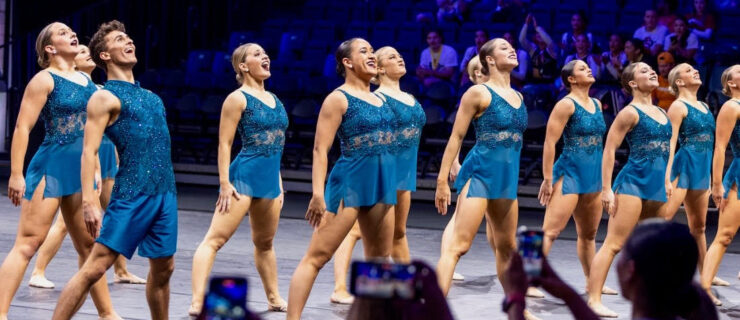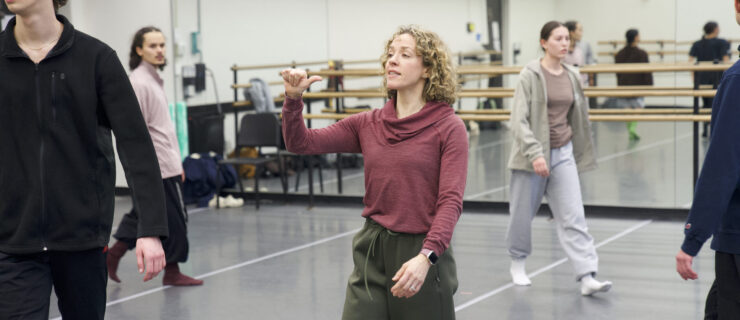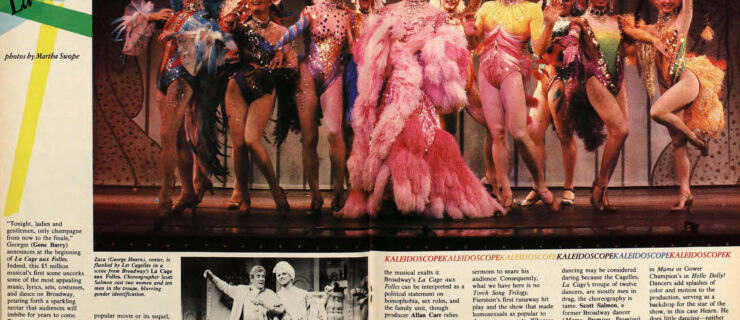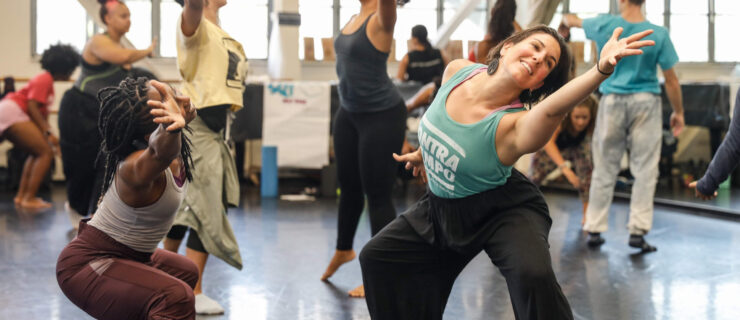On Broadway
“The great thing about the performing arts industry,” says Angel Reed, a 28-year-old dancer who trained in Reno, Nevada, set up shop in Los Angeles, and moved to New York just a few months ago, “is you never know where it will take you. Who would have thought that one day I would be pole-dancing on Broadway?”
Her co-pole-dancers—they also serve as the all-purpose chorus line for the hit 1980s-rock musical Rock of Ages—are Savannah Wise, 24, and Katherine Tokarz, 26. Wise went from playing a 15-year-old in a regional production of Happy Days: The Musical to the in-your-face Rock of Ages. And no trace of the demure tapping Tokarz did in White Christmas (see “On Broadway,” Dec. 2008) can be found in Kelly Devine’s raunchy choreography for Rock of Ages.
The flamboyant gyrations, Wise says, derive from 1980s club dancing “mixed with modern hip hop and classic stripper, an odd mix of obscure, not-really-Broadway genres.” It’s the perfect combination, however, for a show set in a grungy Sunset Strip rock club at the height of bands like Styx and REO Speedwagon. Their biggest hits have been cleverly repurposed to support a jokey plot and two hours of lighter-waving nostalgia.
Rock of Ages
is likely to keep its three Rock-ettes boogying hard for as long as their bodies can take it. It is grueling: They do 19 high-energy dance numbers, sit onstage through another, and sing from backstage in three more, all the while juggling multiple costume pieces, staying clear of catch-prone accessories, and hanging on to their wigs.
“It’s one of the hardest shows I’ve ever done,” says Reed. “It takes a lot of stamina to do that kind of dancing eight times a week.” Her history with the musical began in L.A. three years ago, when it was just a small, limited-run show that writer Chris D’Arienzo and director Kristin Hanggi had done as a goofy tribute to the ’80s. Reed went to see it and loved it so much she kept going back. “Then I heard they were holding auditions to do the show in Las Vegas,” Reed recalls. “Every beautiful dancer in L.A. was there, and I was a little intimidated. But they ended up hiring me that day.”
Wise says she knew the show was for her when her agent alerted her that the choreography had lots of head whipping and some pole dancing. “Even when I was at dances at high school,” she says, “I was always really big on head whips.” As for the pole dancing, she had signed up for a pole dance class because it sounded like fun. It was, and she can now give tips: Leave your legs exposed so they’ll grip the pole when you do spins and turns and when you’re climbing; strengthen your upper body—arms, shoulders, and upper back do lots of the work; and for the most impressive tricks, start with your grip as high as possible. She agrees with Reed that the show is “hard on the body, but a blast.”
Tokarz remembers getting carsick to rock songs from the ’80s as a kid, but she, too, loves the show. Having spent six months in the can-can line at the famed Moulin Rouge in Paris, she’s long since overcome any anxiety over the musical’s R rating. The show’s retro attitude towards its women is balanced for her by the fact that “we’re kind of in on the joke.” For someone who describes herself as “a huge dork,” she adds, “getting to dance in front of a full-on, kick-ass rock band—I’ve just never felt so cool.”
Tokarz began dance class at age 3 in Massachusetts, and her fate was sealed by an older cousin, who was a dancer. “When I was 5 or 6,” Tokarz says, “I saw her perform at Opryland. Later I saw her in Beauty and the Beast at Disney World in Florida, and that was it.”
Wise’s dance pedigree is even stronger. Her parents, the Tony winner Scott Wise and Kiel Junius, met when they were in A Chorus Line, and they exposed their daughter to dance as well as other activities. “My parents wanted me to experience a lot of things,” she says. “In fact, it was almost as if they were trying to get me to do something else.” So it took her a while to embrace her destiny. Another impediment: When she and her mother were living in New Orleans, Junius was pushing mother-daughter ballet class. “It would be embarrassing for some people because their mom wasn’t any good. But it was embarrassing for me because she was so much better!”
There was artistic DNA in Reed’s family background as well: Her grandparents had been opera singers, and her mother was a classically trained pianist. Her passion for dance was encouraged with lessons that led to dance camp and competitions, and eventually, trips to L.A. for master classes with working dancers. “I was really lucky,” Reed says, “to have had a wide variety of influence. In order to be a professional these days, you have to study everything.”
And you never know when a pole dancing class can come in handy.
Sylviane Gold writes on theater for
The New York Times.
Photo: Joan Marcus, courtesy
Rock of Ages




